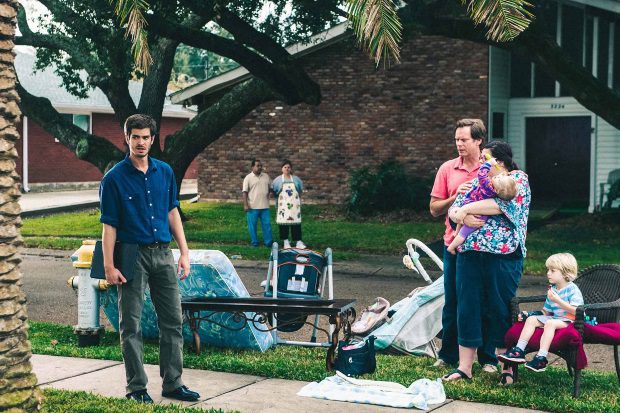Foreclosures on the Silver Screen

The housing market collapse of 2008 and the thousands of American homeowners who suffered because of it have mostly faded from the headlines, and likewise from the minds of the public. Yet homeowners in the hardest-hit areas of the country continue to feel the aftereffects of the crisis in the form of constant threat of foreclosure and eviction.
In “99 Homes,” opening nationwide this week, director Ramin Bahrani seeks to put these recent victims of foreclosure back on the map. Though it sounds like the stuff of documentary, the film has the build of a thriller. Right from the movie’s dizzying opening shot, Bahrani ratchets the intensity up to 11, lending a near-apocalyptic quality to the anxiety of the dispossessed at the story’s center. To see a family gripped by the fear of losing their home at any given moment is one thing; to feel it, as we do watching this film unravel, is another.
Set in Florida in 2010 at the height of the housing crisis, the film hones in on contractor Dennis Nash (Andrew Garfield), a single father barely providing for his mother (Laura Dern) and young son (Noah Lomax). Just one day after winning a court extension to settle their foreclosure, the family receives an unexpected eviction from the odious real estate broker Richard Carver (Michael Shannon). Desperate not to fail his son or disappoint his mother, Nash begins working for Carver and soon finds himself evicting the very friends and neighbors who once had his family’s back.
Garfield, Shannon, and Dern all bring the requisite talent to their roles, Garfield and Dern especially selling us on their working class plight in spite of their name recognition. But surprisingly it’s the characters at the film’s periphery who leave the most lasting impressions—and they’re not even played by actors at all.
Bahrani’s previous films have typically featured nonactors in starring roles. Although the director wanted to bring on professionals who would be well-suited for this film’s thriller elements, “99 Homes” is still largely populated by real people. From the police officers accompanying Carver on his eviction rounds to Nash’s cadre of fellow construction workers, the supporting cast give us a firsthand look at how the housing crisis has affected an entire community.
In one memorable sequence where Nash must deliver foreclosure notices to a slew of homeowners, half of the families he visits are really nonactors in their own homes. Bahrani didn’t tell Garfield which residents would be paid professionals and which ones wouldn’t, and the improvisation pays heartbreaking dividends. Garfield’s interactions with these folks bear none of the usual Hollywood artifice. We get a truer sense not only of what it’s like to be on the receiving end of the bad news, but how it feels to be the one in the uncomfortable—and at times dangerous—position of delivering it.
Even while it urges us to cheer for the working class, “99 Homes” admirably refuses to see the Rick Carvers of the world as the out-and-out villains of the housing crisis. Bahrani astutely recognizes that brokers like Carver “didn’t sign up to do evictions, they signed up to put people in homes.” The film never exonerates Carver for his oily behavior, but in privileging us with his backstory—Carver, like Nash, grew up in construction with no idea that financially uncertain times would one day twist his moral compass—it prevents us from passing facile judgment.
As the film progresses, Nash follows Carver’s trajectory down a slippery slope of illegal activity, all in the name of reclaiming his family’s home. By the time Nash’s neighbors fight back against his betrayal of the community’s trust, we too are caught between a rock and a hard place. We aren’t proud of Nash’s treachery, but having seen how both courts and banks have misled him, we can understand why he would stoop to such deplorable lows.
Before reaching its explosive finale, “99 Homes” puts the brakes on its otherwise gripping momentum for a brief detour into Message Movie territory. In a pivotal scene, Carver lectures Nash on how America was built “by rigging a nation of the winners, for the winners, by the winners.” There’s a faintly gross irony in watching one Hollywood actor make this grandiose pronouncement to another, but the bad taste doesn’t linger. Many filmmakers have grand intentions of excoriating financial and bureaucratic corruption; few bother to go as far as Bahrani does in giving the actual victims a moment in the spotlight.
Tim Markatos is an editorial assistant at The American Conservative.
Comments